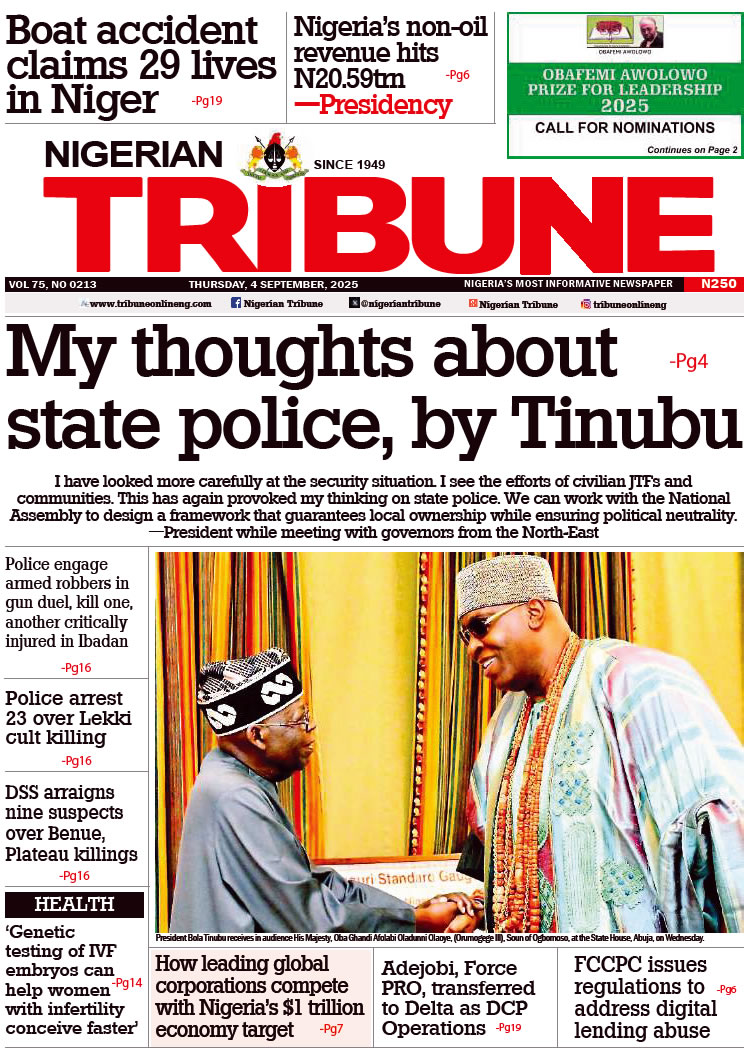Leadership is a venture in paradoxes; a journey in contradictions. Very often leaders are in a dilemma because they find themselves torn between two contradictory options. It is for this reason that some of them sometimes appear confused because they are faced with a situation in which they have to choose between two contradictory but equally compelling and appealing options. To excel, the leader needs to know which of the contradictory alternatives is the appropriate one at any given time.
Let us have a look at some leadership paradoxes.
Confidence Vs humility
Leaders are expected to exude confidence and humility at the same time.
Confidence
A leader cannot afford to be without confidence because it is the foundation of leadership. As said by Francisco Dao, a leadership consultant, “Self-confidence is the basis from which leadership grows. Trying to build leadership without first building confidence is like building a house on a foundation of sand. It may have a nice coat of paint, but it is ultimately shaky at best.”
A leader must know the way and must be assertive in showing it. Without confidence every other competence a leader possesses pales into insignificance because it is the leader’s confidence that births confidence in those who follow him and motivates them to go the extra mile to achieve set goals.
People trust leaders who are confident and are sure of what they want and demonstrate knowledge of how to get it. It is the confidence of the leader that attracts people to him and earns him their trust. Without the followers’ trust and belief in the leader, not much gets done.
A confident leader is not threatened by the outstanding performance of those who work with him. Rather, he is challenged by it and he gets motivated to also up his game. So, instead of working against the interest of others, he encourages them to be their best. As a result, he is able to build a great network that does not only work for his own good but also for the good of those who cooperate with him.
Humility
At the other end of the spectrum is humility. Without humility a leader cannot go far. A leader may attract good hands through his competence but without humility he cannot retain them. Defining humility, Amy Y. Ou et al, in Humble Chief Executive Officers’ Connections to Top Management Team Integration and Middle Managers’ Responses, say “humility is manifested in self-awareness, openness to feedback, appreciation of others, low self-focus, and pursuit of self-transcendence. Humble people willingly seek accurate self-knowledge and accept their imperfections while remaining fully aware of their talents and abilities. They appreciate others’ positive worth, strengths, and contributions and thus have no need for entitlement or dominance over others.”
Rick Warren puts it this way: “Humility is not denying your strengths. Humility is being honest about your weaknesses.”
Success has its downside which is the tendency to believe that one is better than the rest. Harbouring this belief is the beginning of an imminent descent. But humility saves the leader from such slide by helping him to take attention away from himself to others. It enables the leader to accommodate the views of others and makes adjustment where necessary. Humility saves the leader from losing focus and helps him to concentrate on what is essential. Without humility, the leader will operate alone and may find out to his consternation when it is too late that the road he took is not the right one. Hence, the appropriateness of the counsel of John Wooden, an American basket ball coach, to his players that “Talent is God-given. Be humble. Fame is man-given. Be thankful. Conceit is self-given. Be careful.”
Optimism Vs reality
Leaders are advised to be optimistic and realistic simultaneously.
Optimism
Leaders are dealers in hope, according to Napoleon Bonaparte. This means, as explained by John Maxwell, that a leader must be able to make others believe that the impossible is possible. For a leader to ignite hope in others, he himself must be full of optimism. Leadership has to do with creating the picture of a great future to which people can aspire. To create such a picture, the leader must be upbeat about the future.
An optimist sees things from the bright side. A leader, even when things are not going right, is expected to be optimistic because everyone takes a cue from him. When things are wrong everybody looks up to the leader to assure them that things will still turn right. If they get this assurance from him, they continue with hope for a better turn out of events. But if he exhibits any sign that things have gone awry and are likely to remain so, he dampens the spirit of the people and they lose the ability to forge ahead. They lose hope. It is for this reason that leaders are dealers of hope. A leader must learn to hope against hope. No leader is complete without an ample dose of optimism.
Reality
Many leadership experts are agreed that one of the basic responsibilities of a leader is to face reality. They posit that until the leader sees the reality as it is and comes to terms with it, there is not much he can do to change it. Hence, they argue that until a leader is able to face reality, he has not started leading. That is why Max DuPree, former CEO of Herman Miller, says the first responsibility of a leader is to define reality.
But Jack Welch, former Chairman of General Electric, drives home the point better. He says, “The art of managing and leading comes down to a simple thing. Determining and facing reality about people, situations, products, and then acting decisively and quickly on that reality. Think how many times we have procrastinated, hoped it would get better. Most of the mistakes you’ve made have been through not being willing to face into it, straight in the mirror that reality you find, then taking action on it. That’s all managing is, defining and acting. Not hoping, not waiting for the next plan. Not rethinking it. Getting on with it. Doing it. Defining and doing it.”
Courage Vs compassion
A leader is looked upon to exhibit courage and compassion with equal measure.
Courage
One of the major characteristics of great leadership is courage. A leader needs courage to blaze a trail; he needs courage to champion a change; he needs courage to take risks. Without blazing a trail, leading a change and taking risks the leader will not make an impact. Leaders are agents of change. Change is impossible without courage. Therefore, leadership is a sham without courage because the leader will just do what is convenient, only to find out at the end of his time that not only has he frittered the opportunity that leadership thrusts on him but that he has also wasted the time of the people he is meant to lead.
Aristotle says courage is the most important virtue in leadership because it is the one that makes all other virtues possible. So, a leader who is deficient in courage is most likely to be deficient in all other leadership attributes. Even if he is not deficient in them, he will not have the ability to display such virtues in the face of opposition because of the absence of courage.
Compassion
Tibetan scholar, Thupten Jinpa, defines compassion as a mental state endowed with a sense of concern for the suffering of others and aspiration to see that suffering relieved. According to him, compassion has three components: cognitive, which connotes, “I understand you”; affective, which says, “I feel for you” and motivational, which tells the other person, “I want to help you.”
Leaders are expected to show understanding for others, feel what they feel and strive to help them.
When leaders are compassionate they build cohesive and powerful teams. A compassionate leader is more interested in the wellbeing of his team members than he is in the execution of the task or himself. This is the strength of compassionate leadership because when the leader shows that a team member is more important than the assignment, the action elicits reciprocity from the team member. With that, he becomes more committed and loyal to the team because he does not want to betray the trust reposed in him by the leader.
Hence, as observed by Google team, great companies have compassionate leaders.
Being decisive Vs building consensus
Leaders are expected to demonstrate decisiveness and also build consensus.
Being decisive
Team members respect leaders who are decisive, those who are able to think on their feet and arrive at a decision without much ado. Being decisive is very critical because ideas are not localised. An idea usually occurs to a number of individuals in different parts of the world at the same time but the one who is able to swing into action immediately is the one who profits from such idea. Therefore, a leader who has the ability to move at the speed of light with respect to decision making has an edge over those who are slow to decide. Often in leadership it is said that making a wrong decision is better than not making any at all.
Building consensus
Leaders are encouraged to build consensus in decision making so that everyone feels involved. The leader alone cannot run the show; he needs the involvement of others. It is for that reason that leaders are encouraged to involve others in the decision-making process. It is said that when everyone contributes to the making of a decision, the idea is not seen as that of the leader alone but that of the whole team. With that, the decision is owned by all and everyone involved works towards the realisation of the decision.
The bottom line
A leader is made by the decisions he makes and when he makes such. What is right in a moment may be wrong the next one. A leader must know when to be confident or humble; dictatorial or democratic; optimistic or realistic. The challenge is; how does a leader become this versatile? How does he know which of the alternatives he is daily faced with is appropriate at a particular time? A leader gets to this point by being unflaggingly committed to continuous learning. A leader must saturate his mind with so much information that he is able to make the right decision even unconsciously.
Jack Welch, in his book, Straight from the Gut, says that most of the decisions he made as the CEO of General Electric were from his gut. According to him, many times he had to go against the grain, acting contrary to professional advice and relying on his instincts. But he was often right. How did he get to the point that when confronted with contradictory options he intuitively knew what was right? He got to that point through his total commitment to self development in line with what he was doing. People become what they constantly do. Welch devoted himself to the consumption of information about what he was doing to the extent that even when he took a decision unconsciously, he was sure it would be the right one.
Leaders cannot wish away paradoxes. But to avoid being confused and ending on the wrong route, they have to develop their sixth sense. This is done by building themselves up to the point that taking the right step, albeit unconsciously, comes to them naturally.
Last line
When leaders take personal development seriously, they become versatile and are able to handle complex situations routinely.
READ ALSO FROM NIGERIAN TRIBUNE
WATCH TOP VIDEOS FROM NIGERIAN TRIBUNE TV
- Let’s Talk About SELF-AWARENESS
- Is Your Confidence Mistaken for Pride? Let’s talk about it
- Is Etiquette About Perfection…Or Just Not Being Rude?
- Top Psychologist Reveal 3 Signs You’re Struggling With Imposter Syndrome
- Do You Pick Up Work-Related Calls at Midnight or Never? Let’s Talk About Boundaries







